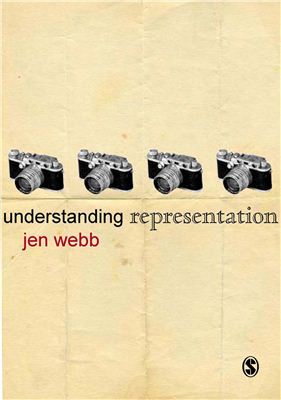London: Sage. 2009
Understanding Representation offers a contemporary, coherent and genuinely interdisciplinary introduction to the concept of representation. Drawing together the full range of ideas, practices, techniques and disciplines associated with the subject, this book locates them in a historical context, presents them in a readable fashion, and shows their relevance to everyday life in an engaging and accessible manner. Readers will be shown how to develop a sophisticated attitude to meaning, and understand the relationship to truth and identity that is brought into focus by communicative practices.
With chapters on linguistic and political representation, art and media, and philosophical and cognitive approaches, Understanding Representation:
- guides readers through complex theoretical terrain with a highly readable and refreshing writing style
- explains the techniques and perspectives offered by semiotics, discourse analysis, poetics, politics, narratology, visual culture, cognitive theory, performance theory and theories of embodied subjectivity
- covers the new ideas and practices that have emerged since the work of Barthes, Eco and Foucault - especially communication and meaning-making in the digital environment, and the new paradigms of understanding associated with cognitive theories of identity and language
- teaches readers how to interpret and interrogate the world of signs in which they live.
Understanding Representation provides students across the social sciences and humanities with an invaluable introduction to what is meant by 'representation'.
Understanding Representation offers a contemporary, coherent and genuinely interdisciplinary introduction to the concept of representation. Drawing together the full range of ideas, practices, techniques and disciplines associated with the subject, this book locates them in a historical context, presents them in a readable fashion, and shows their relevance to everyday life in an engaging and accessible manner. Readers will be shown how to develop a sophisticated attitude to meaning, and understand the relationship to truth and identity that is brought into focus by communicative practices.
With chapters on linguistic and political representation, art and media, and philosophical and cognitive approaches, Understanding Representation:
- guides readers through complex theoretical terrain with a highly readable and refreshing writing style
- explains the techniques and perspectives offered by semiotics, discourse analysis, poetics, politics, narratology, visual culture, cognitive theory, performance theory and theories of embodied subjectivity
- covers the new ideas and practices that have emerged since the work of Barthes, Eco and Foucault - especially communication and meaning-making in the digital environment, and the new paradigms of understanding associated with cognitive theories of identity and language
- teaches readers how to interpret and interrogate the world of signs in which they live.
Understanding Representation provides students across the social sciences and humanities with an invaluable introduction to what is meant by 'representation'.

